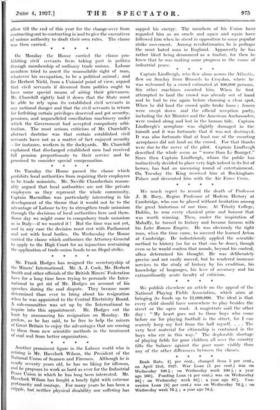On Monday the House carried the clause pro- hibiting 'Civil
servants filin taking part in politics through membership of Ordinary trade unions. Labour members tried to assert the unassailable right of man, whatever- his occupation, to be a political animal ; and Sir Herbert Nield, froM a Unionise point of view, argned that civil servants if divorced from politics ought to have some special means of airing their grievances. Mr. Churchill rightly laid it down that the State must be able to rely upon its established civil servants in any national danger and that the civil servants in return for forfeiting certain privileges deserved and got security, pensions, and unparalleled conciliation machinery under which the Government had accepted compulsory arbi- tration. The most serious criticism of Mr. Churchill's abstract doctrine was that certain established civil servants have not as a matter of fact enjoyed security —for instance, workers in the dockyards. Mr. Churchill explained that discharged established men had received fall pension proportionate to their service and he promised to consider special compensation.






































 Previous page
Previous page